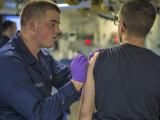Jul 23, 2003 (CIDRAP News) Two women in their 50s suffered dilated cardiomyopathyenlargement of the heartwithin 3 months after receiving smallpox shots, but it was unclear whether the shots caused the condition, the Centers for Disease Control and Prevention (CDC) reported recently.
The two cases represent the first indication of a possible association between smallpox shots and dilated cardiomyopathy (DCM), the CDC said in the Jul 11 Morbidity and Mortality Weekly Report. "However, whether vaccination caused these illnesses or whether the two cases were coincidental and would have occurred anyway is unclear," the report stated.
DCM involves enlargement of the heart with impaired functioning of the left and/or right ventricles, resulting in symptoms such as shortness of breath, fainting, and arrhythmias, the CDC said. The condition has many possible causes, including infections, but in about half of all cases the cause is never determined.
In one study of 673 DCM patients, 12% had myocarditis (heart inflammation), a complication that has been seen in a number of recent smallpox shot recipients, according to the CDC. Some 21 cases of myocarditis or pericarditis had been reported among civilian vaccinees as of Jun 20.
"Because smallpox vaccination appears to be associated with myocarditis, which can cause DCM, further evaluation [of the possible link] is warranted," the article stated.
One patient, a 53-year-old with a history of borderline hypertension and obesity, had fatigue and dyspnea starting about a week after her smallpox revaccination in late February, according to the report. She eventually was treated for hypertension, and later was found to have a heart murmur. In late May she experienced chest pain, and cardiac catheterization indicated DCM in the absence of coronary artery disease. She was treated with medication and continued working, the report said.
The report describes the second patient as a 55-year-old with a history of obesity, hypertension, diabetes, and hyperlipidemia. She experienced muscle and joint pain and a slight fever 9 days after her smallpox revaccination in late February. In the ensuing weeks she had periodic fatigue and two episodes of palpitations. In June she was found to have a heart murmur, and further tests revealed various signs of nonischemic DCM. Her medications were adjusted and she continued working, according to the article.
The report said the CDC was evaluating the expected rate of DCM in the population to determine if the observed rate among civilian vaccinees2 in about 38,000is higher than expected. The agency will develop guidelines for evaluating possible DCM cases after smallpox vaccination, and it advised clinicians who treat smallpox vaccinees with possible DCM to report the cases to state health departments and the Vaccine Adverse Event Reporting System.
CDC. Update: cardiac and other adverse events following civilian smallpox vaccinationUnited States, 2003. MMWR 2003;52(27):639-42 [Full text]




















